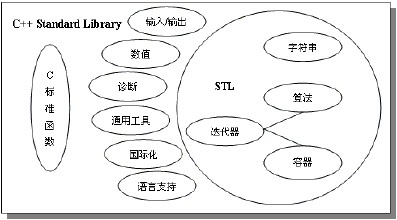常用的STL查找算法
常用的STL查找算法
《effective STL》中有句忠告,只管即便用算法替代手写循环;查找少不了循环遍历,在这里总结下常用的STL查找算法;

查找有三种,即点线面:
点便是查找目标为单个元素;
线便是查找目标为区间;
面便是查找目标为集合;
针对每个类另外查找,默认的比力函数是相称,为了餍足更富厚的需求,算法也都提供了自界说比力函数的版本;
单个元素查找
find() 比力条件为相称的查找
find()从给定区间中查找单个元素,界说:
template
InputIterator find (InputIterator first, InputIterator last, const T& val);
示例,从myvector中查找30:
int myints[] = { 10, 20, 30, 40 };
std::vector myvector (myints,myints+4);
it = find (myvector.begin(), myvector.end(), 30);
if (it != myvector.end())
std::cout << "Element found in myvector: " << *it << '\n';
else
std::cout << "Element not found in myvector\n";
find_if() 自界说比力函数
std::find_if():从给定区间中找出餍足比力函数的第一个元素;示例,从myvector中查找可以或许被30整除的第一个元素:
bool cmpFunction (int i) {
return ((i%30)==0);
}
it = std::find_if (myvector.begin(), myvector.end(), cmpFunction);
std::cout << "first:" << *it <
TAG:
count() 统计元素出现次数
std::count():统计区间中某个元素出现的次数;std:count_if():count()的自界说比力函数版本
search_n() 查询单个元素重复出现的地位
search_n(): find用来查询单个元素,search_n则用来查找区间中重复出现n次的元素;
示例:查询myvector中30一连出现2次的地位:
int myints[]={10,20,30,30,20,10,10,20};
std::vector myvector (myints,myints+8);
it = std::search_n (myvector.begin(), myvector.end(), 2, 30);
search_n() 支持自界说比力函数;
adjacent_find() 查询区间中重复元素出现的地位
adjacent_find() 查询区间中重复元素出现的地位,该算法支持自界说比力函数;
lower_bound() 有序区间中查询元素边界
lower_bound()用来在一个排序的区间中查找第一个不小于给定元素的值:示例:查找容器v中不小于20的下界:
int myints[] = {10,20,30,30,20,10,10,20};
std::vector v(myints,myints+8); // 10 20 30 30 20 10 10 20
std::sort (v.begin(), v.end()); // 10 10 10 20 20 20 30 30
std::vector::iterator low,up;
low=std::lower_bound (v.begin(), v.end(), 20);
std::cout << "lower_bound at position " << (low- v.begin()) << '\n';
雷同算法有upper_bound(),查找有序区间中第一个大于给定元素的值;还有equal_range(),查找有序区间的上下边界;(一次前往lower_bound()和upper_bound());
binary_search() 有序区间的二分查找
binary_search() 用来在一个有序区间中利用二分法查找元素能否在这个区间中,注,这个算法的前往值为bool,不是下标地位,其外部的算法逻辑和lower_bound()相似,举动体现为:
template
bool binary_search (ForwardIterator first, ForwardIterator last, const T& val)
{
first = std::lower_bound(first,last,val);
return (first!=last && !(val<*first));
}
示例:从有序区间v中找3能否存在:
int myints[] = {1,2,3,4,5,4,3,2,1};
std::vector v(myints,myints+9); // 1 2 3 4 5 4 3 2 1
std::sort (v.begin(), v.end());
if (std::binary_search (v.begin(), v.end(), 3))
std::cout << "found!\n"; else std::cout << "not found.\n";
min_element() 查找最小元素
min_element() 在给定区间中查找出最小值;
int myints[] = {3,7,2,5,6,4,9};
std::cout << "The smallest element is " << *std::min_element(myints,myints+7) << '\n';
雷同算法有:max_element() 查找最大值;
区间查找 search()
search() 查找子区间首次出现的地位
find()用来查找单个元素,search()则用来查找一个子区间;示例:从myvector中查找出现子区间[20,30]的地位:
int needle1[] = {20,30};
it = std::search (myvector.begin(), myvector.end(), needle1, needle1+2);
if (it!=myvector.end())
std::cout << "needle1 found at position " << (it-myvector.begin()) << '\n';
search支持自界说比力函数;示例:查询给定区间中每个元素比目标区间小1的子区间;
bool cmpFunction (int i, int j) {
return (i-j==1);
}
int myints[] = {1,2,3,4,5,1,2,3,4,5};
std::vector haystack (myints,myints+10);
int needle2[] = {1,2,3};
// using predicate comparison:
it = std::search (haystack.begin(), haystack.end(), needle2, needle2+3, cmpFunction);
find_end() 查找子区间最后一次出现的地位
search() 用来查找子区间第一次出现的地位,而find_end()用来查找子区间最后一次出现的地位:find_end()支持自界说比力函数;
equal() 果断两个区间能否相称
equal()用来果断两个区间能否相称,该算法支持自界说比力函数;
mismatch() 查询两个区间首次出现不同的地位;
mismatch() 查询两个区间起首出现不同的地位,这个算法也支持自界说比力函数;
集合查找
find_first_of 查找集合中的恣意一个元素
find_first_of()用来查找给定集合中的恣意一个元素:示例:从haystack中查找A,B,C出现的地位:
int mychars[] = {'a','b','c','A','B','C'};
std::vector haystack (mychars,mychars+6);
int needle[] = {'C','B','A'};
// using default comparison:
it = find_first_of (haystack.begin(), haystack.end(), needle, needle+3);
find_first_of支持自界说比力函数;
- 文章作者: 福州军威计算机技术有限公司
军威网络是福州最专业的电脑维修公司,专业承接福州电脑维修、上门维修、IT外包、企业电脑包年维护、局域网网络布线、网吧承包等相关维修服务。
版权声明:原创作品,允许转载,转载时请务必以超链接形式标明文章原始出处 、作者信息和声明。否则将追究法律责任。
TAG:
|
评论加载中...
|
上一篇: 黑软应用-炸弹
下一篇: 没有了!


